Misleading by Mistranslation
How a cluster of Russian sites ran a fake story based on a false translation
Misleading by Mistranslation
Share this story
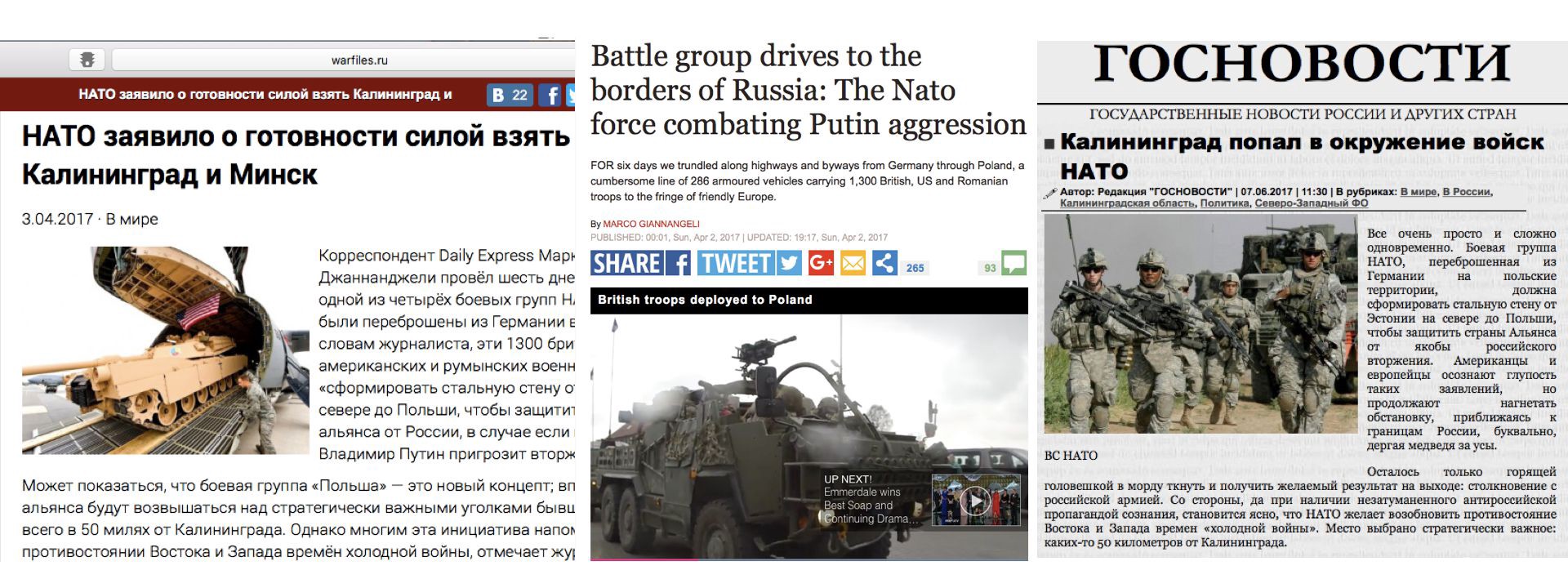
BANNER: Headlines on the NATO deployment. The Daily Express, center, quoted a US officer as saying he did not expect to see Kaliningrad or Belarus. Warfiles.ru and Gosnovosti, left and right, misquoted him to claim that NATO is ready to attack.
One of the four main techniques of Russian disinformation is distortion, misreporting the facts on the ground in order to confirm a chosen narrative. As @DFRLab has reported, earlier distortions used grossly inflated figures, doctored images, and fake social media posts to achieve their effect.
The present case involves what appears to be the deliberate mistranslation of a quote in a Western tabloid to create the impression that NATO has aggressive intentions towards Russia — a key theme of Kremlin propaganda.
The original story
The case in question began on April 2, when British tabloid the Daily Express ran an article by correspondent Marco Giannangeli on the deployment of British forces to the Baltic States as part of NATO’s enhanced Forward Presence (eFP) in the region.
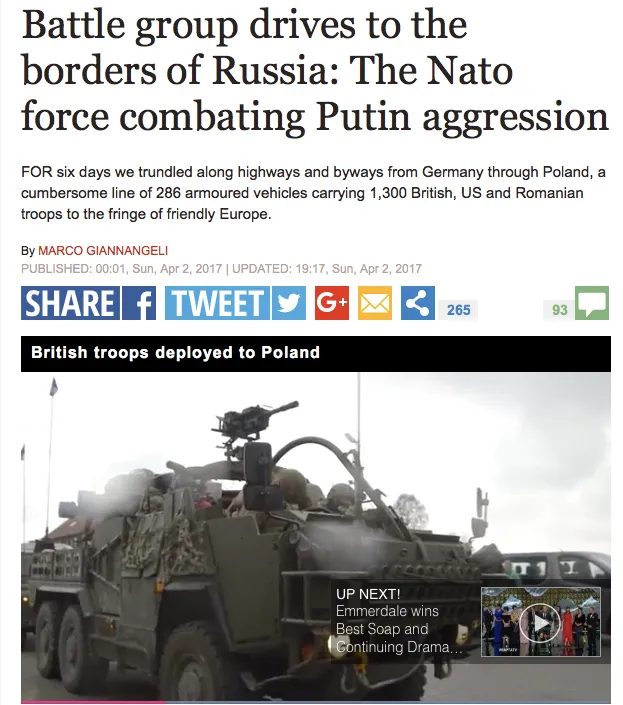
The article quoted a number of officers from the British and US armies, including US Lt. Col. Steve Gventer, who was quoted as saying:
Once we’re set up, we’ll be spending time sizing up the terrain, with all its lakes and waterways, and finding the defensive positions in case the enemy attacks. (…) But I don’t expect to see Kaliningrad or the Belarusian border. Our intent is to work out how we’d be able to defend sovereign Nato territory.
The article was picked up by thirteen Russian language media outlets. Seven of them significantly misquoted Lt. Col. Gventer’s comment, rendering “I don’t expect” as “It’s possible that we will”:
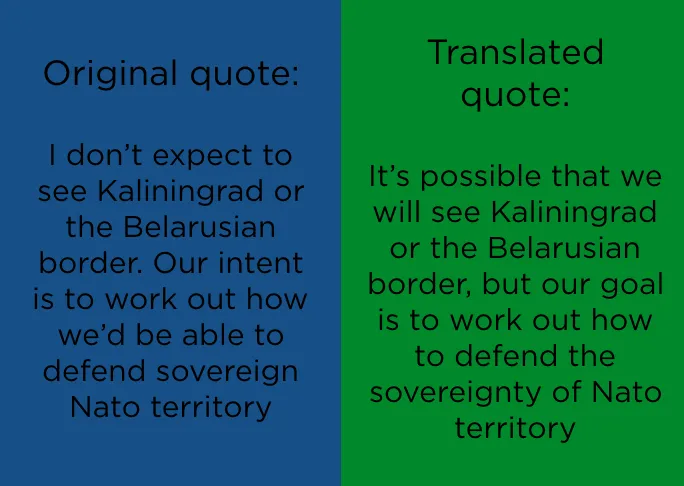
This, in turn, was used to imply that NATO is planning an assault on Kaliningrad and Belarus:
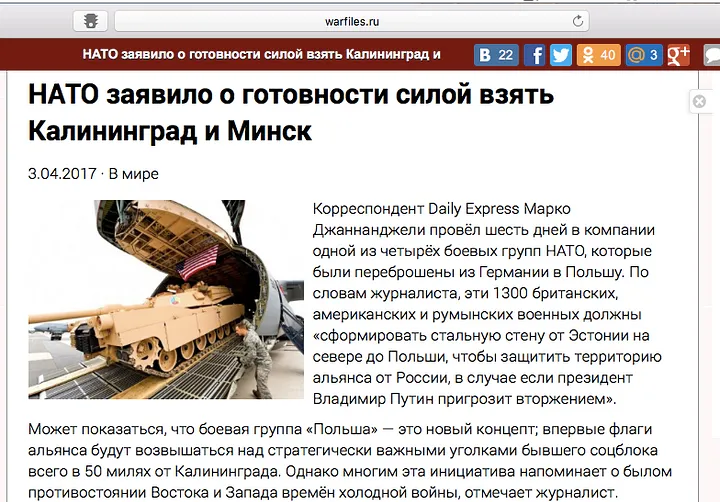
The false quote was first used in WarFiles — a platform that publishes user-generated content on military, geopolitics, defense, and security. It was shared over 500 times on Facebook.
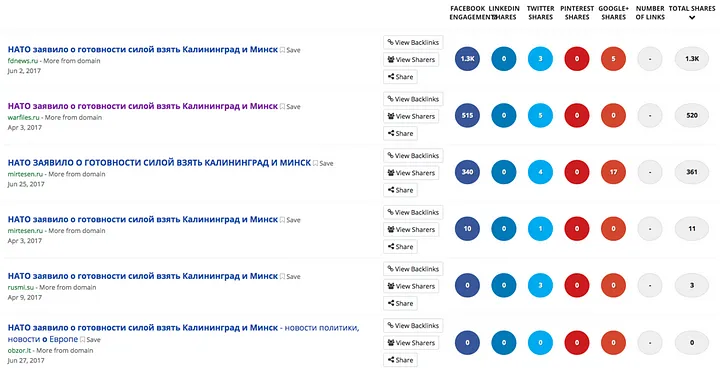
Fake or mistake?
It is important to assess whether the error is likely to have been an innocent translator’s mistake, or deliberate. The Russian phrase used was, “Возможно, мы увидим Калининград или белорусскую границу, но наша цель — выяснить, как защитить суверенитет территории НАТО.” Literally translated, this means, “It’s possible that we will see Kaliningrad or the Belarusian border, but our goal is to work out how to defend the sovereignty of NATO territory.”
The second half of the warfiles.ru quote, from “but,” is broadly accurate; it certainly does not pervert the overall meaning. The problem lies in the translation of Gventer’s phrase, “I don’t expect to see Kaliningrad or the Belarusian border,” as “It’s possible that we will see Kaliningrad or the Belarusian border.” This converts a negative statement (“I don’t expect”) into a positive one (“It’s possible we will”), and builds a narrative of aggression on the result.
The warfiles.ru article contained a large number of other quotes from the Express article, which appear to have been translated accurately; this shows the translator had at least a baseline of competence.
Moreover, it is worth noting the translation of the quote used by other Russian outlets at the same time, notably state broadcaster RT Russian and daily Pravda: “Я не жду, что мы увидим Калининград или белорусскую границу.” This is a much more literal translation, correctly portraying the statement as negative, and the phrase used to translate “I don’t expect,” “ Я не жду,” is extremely common.
The likelihood is therefore that the warfiles.ru mistranslation was deliberate, and chosen to reinforce the narrative of NATO aggression.
Spreading the fake
The warfiles.ru article was reproduced the same day by rusmi.su, a self-styled “information agency” whose stated goal is to “support the national leader and head of state — Vladimir Vladimirovich Putin” and whose values include:
We are for strengthening the image of man in society as the father of children, the head of the family and clan, the noble warrior-defender, the creator and laborer. We are for strengthening the image of woman in society as the mother, protector of the home and hearth, and keeper of the house!
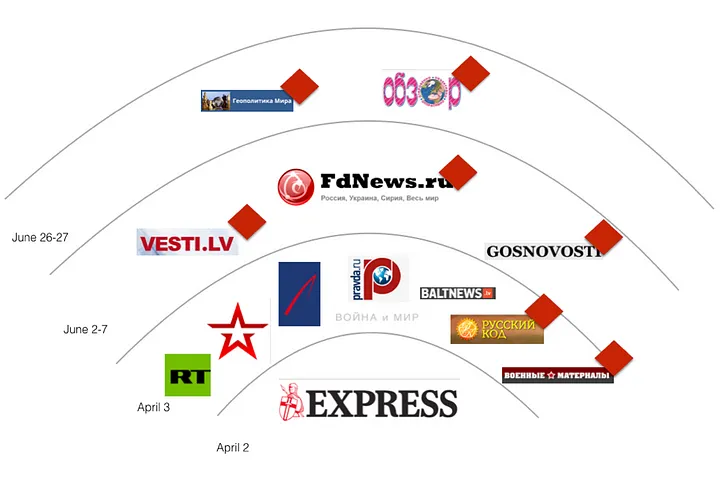
No other outlet picked up the fake story in April. However, in June it was re-launched by a site called fdnews.ru, which specializes in pro-Kremlin and anti-Ukrainian stories. The site appears to be a political clickbait website generating over 95% of its traffic from social media, primarily Facebook and Russian social media networks Vkontakte and OK.ru, according to similarweb.com.
Its pickup of the warfiles.ru story was shared over a thousand times on Facebook and spread to Russian-language Latvian media outlet Vesti.lv, Russia’s Gosnovosti, a blog on mirtesen.ru, and a Russian-language outlet in Lithuania, obzor.lt. Of note, Vesti.lv also amplified a fake story on the number of U.S. tanks deploying to Europe at the beginning of 2017, showing a track record of disinformation which has been underlined by investigative group Re:Baltica.
Together, these articles generated close to 2,000 Facebook shares and an unknown number of shares on Russian social media platforms.
Conclusion
This is not the first time that the pro-Kremlin media have distorted quotes in the foreign-language media to create a propaganda effect. In August 2016, for example, Sputnik’s English service misquoted a Norwegian article as accusing German Chancellor Angela Merkel of behaving like an “autocrat,” when the original said that she “reigned almost supreme” in German politics.


The twisting of a positive story into a negative one fits into the Kremlin’s broader pattern of attacking and undermining Merkel ahead of German elections in September.
The perversion of the Daily Express story is significant for two reasons. First, it shows the extent to which such fake stories can spread and endure. The warfiles.ru article did not have a massive impact, but it reached hundreds of social media users and was still being circulated almost three months after its initial launch.
Second, it shows the ease with which fake news can be created. The article in question built on a mistranslation of just three words — “I don’t expect” — to validate an entire narrative of NATO aggression and perfidy. It is a cheap trick, in the literal sense as well as metaphorical: such mistranslations, which give falsehood a veneer of authority, can be produced at next to no cost. It is likely that many more remain to be uncovered.

